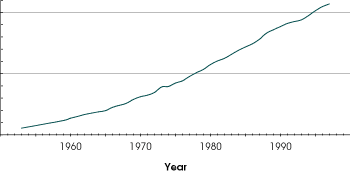

 | |||
At the end of this millennium it is appropriate for us to reflect upon the
world we are passing on to our children. We are the first generation in human
history with the capacity to impact the entire global system. Atmospheric CO2
concentrations have been measured carefully since 1957 at Mauna Loa, and the
increase has been steady at about 0.3% per year since then, a direct result of
fossil fuel combustion. Atmospheric CO2 in itself, is not dangerous, it actually
helps plants grow faster. But scientists see it as a canary in the coal mine,
the leading indicator of other global scale human impacts on the biosphere, the
sum total of living organisms on the land and in the oceans. Whether the
collective impacts of humans on the Earth are benign, or on a trajectory to
future disaster is an ethical question we must now confront. However, studying
the entire Spaceship as a functioning Earth System had never been tried before,
until now. |
| ||
 |
 |
The concentration of carbon dioxide in the atmosphere has increased from 310 to over 360 parts per million in the past 50 years. Carbon dioxide traps heat near the Earth's surface, and its increase may lead to global warming. (Graph by Robert Simmon, based on data from the National Oceanographic and Atmospheric Administration) | |
In July 1983, NASA published with little fanfare, the report of a
small group of scientists aptly named Land-Related Global Habitability Science
issues. This brainstorming by about 20 scientists, including myself, was a first
attempt to think how the entire earth could be monitored carefully and
continuously to evaluate global change trends. NASA spent the rest of the 1980s
designing a system to measure global habitability, and the Earth Observing
System, EOS was conceived in 1990. On Dec 16, 1999, maybe fittingly at the end
of this millennium, we will launch the first satellite designed to fulfill this
vision. The one line summary of the purpose of EOS is to find out "Is the
current human occupancy and activity of planet Earth sustainable?" |
|||
|
The areas of the world with the highest population densities—China and Southeast Asia—are rapidly industrializing. Considering the environmental record of industrialized countries, these developing nations will face important decisions between rapid growth and environmental stewardship. (Map by Robert Simmon, based on data from the Center for International Earth Science Information Network) | ||
It is the
moral imperative of our generation to pass on to our children and grandchildren
a world that is equal in habitability to the world our parents gave to us. The
problem is that as the global population passes 6 billion people, even if
individual resource consumption stayed constant, impacts on the biosphere will
increase. However, we seem to be living in bigger houses, driving fancier cars,
and flying off to more vacations than our parents did. So per capita resource
consumption is not staying constant at all, but increasing. And the developing
world is desperately trying to catch up to these living standards of the
developed countries. Many developing countries are also making the same mistakes
of "development at whatever the environmental cost" that we made 30 years ago.
We learned back then that rivers catching on fire and air pollution that forces
schoolchildren to stay in at recess is unacceptable. The progress in cleaning up
regional pollution in the United States has been remarkable in the last few
decades. But now at the end of the 1990s, as we see a globalized economy, we
also now see a globally interconnected environment. |
| ||
Documenting and monitoring biospheric health, just like human health, should not be a political topic. Biospheric health, and more specifically the sustainability of human life on planet Earth, is a topic that cuts across liberals and conservatives, republicans and democrats. We all want the best for our grandchildren, and to pass on to them a livable world. However, until now, global biospheric health has been largely unmeasurable, so discussions and policy development have been handicapped by a paucity of data. The purpose of EOS is to provide this factual information on trends of change in our biosphere. How we interpret these data, and the course of action we embark on in the next millennium will be a critical political topic. If global change trends turn out to be relatively modest, then only small adjustments in social behavior may be necessary. However if impacts appear to be harmful and accelerating at an unpredictable pace, how can we ignore these early warnings in good conscience? It is essential the new political discussion be based on facts, not conjucture. These are lofty, long range, visionary objectives, similar intellectually to searching for other life in the universe. But global habitability has more immediate significance to us all. Let us hope that EOS allows us to start the new millennium with an enlightened understanding of the changing biosphere. |
|||